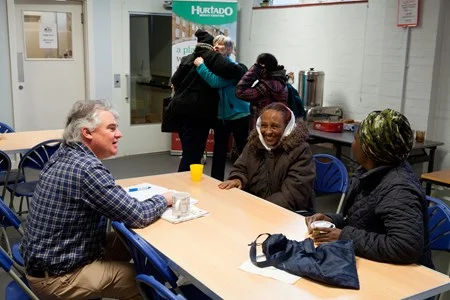There is something particularly troubling about the destitution faced by asylum seekers, and that is that it is deliberate. Unlike so many areas of public policy that cause pain and vulnerability, the years of destitution faced by asylum seekers is not an accident or an unintended consequence of an inequitable economic system. It isn’t a by-product of austerity measures or an administrative cock-up. What marks out this state of destitution is that the cruelty is meted out consciously; destitution is a targeted policy tool, used with intent by government to seek to effect change.
Restoring faith in the safety net
Holes in our benefits safety net are leaving hundreds of thousands of people at risk of hunger and destitution.
It used to be said that one of the main reasons for the absence of ‘absolute’ poverty in the UK was our welfare safety net – one of the crown jewels of the 1945 Welfare State (alongside the NHS and universal free education – both now arguably also under serious threat).
The New Normal
Normalising what should be considered shameful in a ‘civilised’ and rich society such as ours is dangerous as it desensitises us, it stops us getting outraged and therefore wanting to do something about it. I was recently told that I shouldn’t take action on something that I felt was flagrantly unjust just because I felt outraged, meaning that I needed to know my facts and have a thought through strategy in place to achieve my objective.
MIND THE GAP
A dash of treacle: on whether and how Catholic responses to homelessness stand out
In 1864, Father Nugent of Liverpool set up a night shelter for homeless boys, one of many projects he established for destitute children and young people in the city. A few years later, he described its work; the boys ‘were provided with a wash, a basin of coffee and half a pound of bread with a dash of treacle.
Dr Mark Hayes: Industry More Content, Finance Less Proud
Brexit Blog #8 : The Post-Brexit Agenda
That working-class world, with its solidarities and its exclusions, its sources of pride and power and its cruelties, was of course demolished during the 1980s. Economic and social liberalism swept away the old order. If you were gay, female or black, that was in many respects a cause for celebration. But the 2010 encounter between Gillian Duffy and Gordon Brown showed how spectacularly the Left failed to attend to the fall-out in its own heartlands.
Brexit Blog #7 : A Post Brexit Note From Leeds
Brexit Blog #6 : When free movement fails
Free movement should be about the interchange of people and culture. 0.5% of the UK population (about 300,000) emigrates each year. If these are simply replaced by people moving to the UK, there is no net migration, no increase in population. The problem in the UK has been rapid population growth, not migration in itself. Only with a balanced economy across Europe can free movement become the positive force that it should be, once again.
Brexit Blog #5 : Is free movement of labour exploitative?
It is often claimed that the EU is founded on the principles of Catholic Social Teaching. But one of its central tenets is that labour is not of its nature a mere commodity, to be bought and sold at will. It is human. And that applies not just to workers who are mobile but to those who are settled in communities, struggling to make ends meet for their families. Human beings have rights, feelings, obligations and aspirations.
Brexit Blog #4 : Post-Brexit, Sea Sickness and the Golden Thread
William Beveridge, who was fundamental to the founding of the welfare state in 1942, described charity as ‘like a golden thread through the living tapestry of our national story’. The tapestry is somewhat tattered today in the aftermath of the vote to leave the European Union, and the national story somewhat fragmented, perhaps literally if Scotland holds another referendum on independence.
Brexit Blog #3 : Why did Wales 'Leave'?
Brexit Blogs from ABC
Brexit Blog #2 : Migration scenarios
The total betrayal of the people around the issue of migration in the Brexit campaign (In and Out alike, as both campaigns are responsible for not having planned, for not having explained how migration works) glares as we contemplate the paradox of the four migration scenarios that are facing us now.
Brexit Blog #1 : Post-Brexit Stress Disorder
We have yet to find ways to share the values of progressive internationalism with a wider audience. Understandably, we focus on those we know will respond, but in doing so organisations run the risk of re-inscribing marginality, deliberately or not. Deliberately focusing attention on certain sets of people leaves many people overlooked and disengaged. And we can't be surprised by this.
Brexit blogs: Introduction
The Brexit vote has proved a real watershed moment in UK politics. It has made visible deep divisions within and between communities and substantive differences in the way we think about our interests and goods. However, this vote was a complex rather than a simple phenomenon, and it will take us some time to understand its implications for our future: local, regional, national, continental and global.
CCSTP: blogging guidelines
Launch of new Centre for Catholic Social Thought and Practice
Resisting a Politics of Exclusion: Catholic Social Thought’s Counternarrative
Damaging politics of exclusion continue to hold sway across many regions of the globe. Whether in appeals to anxieties about rapid cultural and demographic changes or more overtly nativist or Islamophobic rhetoric, we revisit representations of the outsider as a social menace across diverse contexts.
U.S. Politics and Global Responsibility
Although the U.S. election season seems never ending, there is no substantive discussion of the world beyond the borders. This claim might seem a bit strange. After all, debate organizers are always careful to balance “domestic” and “foreign” policy. But the “foreign policy” discussion fails to appreciate the deep links between the United States and the rest of the world.













